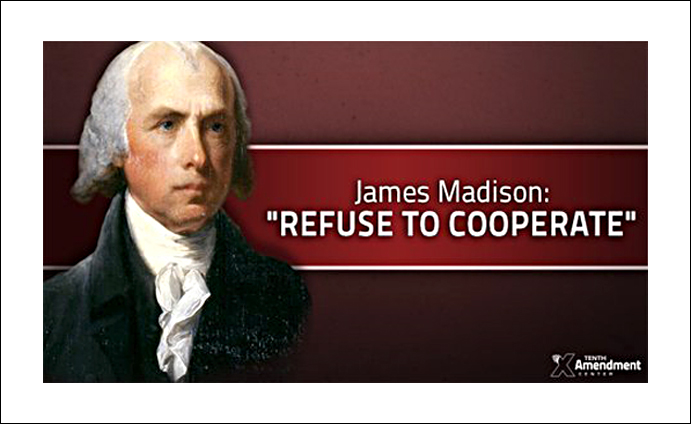welcome
|
||||
THE VICTORY PROCESS
Published on Mar 25, 2015 Alex Jones talks with Sheriff Richard mack about his recent heart attack and how he's still fighting.
The Video The Feds Don't Want You To See
Although no gunshots were fired, what happened at the Bundy Ranch was a shot fired across the bow using the most powerful weapon in the infowar, the camera. It captured the iconic moment of the people taking on an aggressive government tyranny, a snapshot that still reverberates one year later. We look at the lies, the spin and the reality of a federal government openly defying The Posse Comitatus Act as it threatened and brutalized citizens of the community. Although the sheriff did nothing to protect the community, neighbor stood with neighbor in true posse comitatus, the “power of the community”, to expel the federal army from the community. LINK: AGENDA 21 Cliven Bundy Case Example
The Peer-to-Peer Economy Goes Mainstream Published on Apr 28, 2015 As we highlighted in a recent podcast, the peer-to-peer economy is transforming us from a society of middlemen (factories, distributors, corporations) into a society of independent producers capable of interacting directly with customers and like-minded communities. But now the P2P economy is being acknowledged by the mainstream as they attempt to play catch up on an idea that is threatening to topple the old system of control.
Published on May 8, 2015 Horticulturist Ron Finley joins the show today to share his vision for community gardening and rejuvenation. We'll also take your calls during this worldwide broadcast. LINK: Gov Wants Growing Food Illegal
Blueprint To Take Back America Revealed
Published on May 13, 2015 Filmmaker Mike Norris and writer and business entrepreneur Gary Heavin join the show to
discuss their upcoming film AmeriGeddon, and give their take on the Jade Helm military
exercises.
WAR FOR THE FUTURE: HUMANITY’S SECRET DESTINY REVEALED
Published on Apr 29, 2015 Alex Jones reveals the secret to stepping outside the box and releasing humanity's true
potential. As the globalists and social engineers attempt to shutter our minds and stifle our creativity, it is up
to us to Related:
http://tenthamendmentcenter.com/ http://www.libertyclassroom.com/nullification/ http://www.americaagainnow.com/
"Here’s the bottom line. You are not supposed to wait 2 or 4 years for some new politicians to get in office and give your permission to be free. You are not supposed to wait 2 or 4 or 6 years for some federal court to tell you, “ok, you be free now.” You are supposed to stand up resist, refuse to comply and nullify unconstitutional federal acts – as soon as they happen. All the money and time you throw at firing congress or winning in federal court will never, ever work – unless you start resisting right here in your state. And, that resistance needs to be your first response, not your last." - Michael Boldin, Article: James Madison: How to Stop the Federal Government
By: Michael Boldin|Published on: Dec 15, 2014 In response to federal overreach, most people tend to focus on three types of actions to stop them: elections, conventions, and lawsuits. While they all have their place in an overall strategy to defend the Constitution, none of them should be the first step forward. That is, if you follow the advice of the “Father of the Constitution.” Here’s what James Madison had to say in Federalist #46. The Influence of the State and Federal Governments Compared:
Let me translate. Madison said that when the federal government passes an unconstitutional measure there are powerful methods to oppose it – amongst the people and in the states. He also pointed out that those methods were available even for warrantable, that is constitutional, measures. Madison told us of four things that should be done to resist federal powers, whether merely unpopular, or unconstitutional. 1. Disquietude of the people – Madison expected the people would throw a fit when the feds usurped power – even using the word “repugnance” to describe their displeasure. That leads to the next step. 2. Repugnance and Refusal to co-operate with the officers of the Union – Noncompliance. The #1 dictionary of the time defined repugnance as “disobedient; not obsequious” (compliant). If you want to stop the federal government, you have to disobey them. Madison also suggested that people would perhaps directly refuse to cooperate with federal agents. This is an approach we preach here every day at the Tenth Amendment Center. James Madison apparently knew what we know today. The feds rely on cooperation from state and local governments, as well as individuals. When enough people refuse to comply, they simply can’t enforce their so-called laws. 3, The frowns of the executive magistracy of the State – Here Madison envisions governors formally protesting federal actions. This not only raises public awareness; executive leadership will also lead to the next step – legislative action. 4. Legislative devices, which would often be added on such occasions – Madison keeps this open-ended, and in the years soon after, which I’ll cover shortly, we learn how both he and Thomas Jefferson applied this step. Madison also told us that if several adjoining States would do the same it would be an effective tool to stop federal acts. To repeat, he said that doing this “would present obstructions which the federal government would hardly be willing to encounter.” Judge Andrew Napolitano agreed recently and said that people need to stop enforcing unconstitutional federal laws. He also said that if you could get an entire state doing this, it would make federal laws “nearly impossible to enforce.” What’s important to note here, are some glaring omissions. The powerful means that Madison told us would be used to oppose federal power successfully did NOT include federal lawsuits in federal courts. He also did NOT include “voting the bums out” as a strategy, either. FIRST RESPONSE Compare that with how people generally respond to what they consider unconstitutional or unpopular federal acts today. The first thing I tend to hear from people who are opposed to a federal act is the “vote the bums out” mantra. We’ll fire congress, right? Or some people tell us we have to sue and let the courts decide. I’ve got some news for you. There’s nothing from the founders – anywhere – in which they tell us that our first response to extreme, repeated violations of the constitution and liberty is to vote the bums out, or sue the feds in federal court. Nothing. LEGISLATIVE DEVICES Thomas Jefferson followed up on this in 1798 with the same kind of advice. That year, the Adams administration passed a wildly unconstitutional attack on the freedom of speech with the Alien and Sedition Acts. In response, while sitting as vice-president, Jefferson secretly drafted the Kentucky Resolutions, and here’s a little of what he wrote:
Madison was consistent in his views on this. In 1798, he also drafted and help pass something known as the Virginia Resolutions, a state-level “legislative device” in response to the Alien and Sedition Acts. Here’s a key part:
Like Madison advised in Federalist #46, both he and Thomas Jefferson advised a state-level response to dangerous federal acts. In 1798, neither of them even mentioned voting or lawsuits. Jefferson told us that a “nullification is the rightful remedy.” And Madison told us that states are “duty-bound to interpose.” When Daniel Webster called on these same principles in response to military conscription plans during the war of 1812, he said:
Here’s the bottom line. You are not supposed to wait 2 or 4 years for some new politicians to get in office and give your permission to be free. You are not supposed to wait 2 or 4 or 6 years for some federal court to tell you, “ok, you be free now.” You are supposed to stand up resist, refuse to comply and nullify unconstitutional federal acts – as soon as they happen. All the money and time you throw at firing congress or winning in federal court will never, ever work – unless you start resisting right here in your state. And, that resistance needs to be your first response, not your last.
REACH OUT TO OTHERS [Help Educate Family And Friends With This Page And The Links Below]
MORE: What Can We Do? | Silver and Gold | Storable Foods | Surviving WTSHTF | Keep Healthy To Fight | Fighting The Lawless TSA | Fighting Back Against Big Brother | Ambush / Undercover Journalism Psywars - The Selling Out of Alex Jones/Infowars
| ||||


















